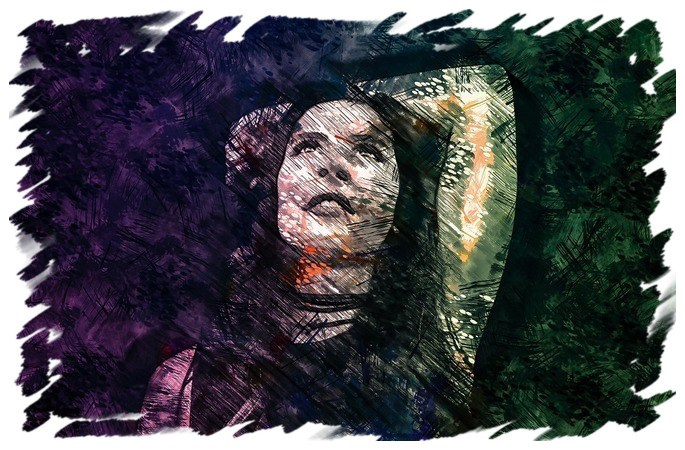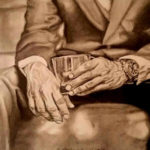The events of the last few months have been too much. The world has been too much. The Virus. George Floyd. Black Lives Matter. Rio Tinto. 434 Aboriginal deaths in custody. 55 Indian journalists arrested for doing their jobs. Our Prime Minister talking Tim Tam diplomacy with his British counterpart. An education minister waging war on education.
Last month, I was enraged, impassioned, energised to speak up. Now, like most people of colour, I’m just angry, fearful and exhausted. The attacks never stop. A brown girl in London eats ice cream in a park, posts a selfie and receives death threats. A white woman in America calls the cops on a black man who told her put her dog on a leash. Another threatens to call the cops on a brown man painting a sign on the wall outside his own home.
Famous Australian racist Alan Jones returns with his own show, because he has missed inciting violence and misogyny. On social media, people post the covers of books they ‘love’ featuring dead racist white males.
Things deteriorate into a meaningless blob of virtue signalling, obfuscation and gaswhiting.
I find it hard to step lightly. To speak softly. To grieve quietly. To write with grace. The world is insistent and closes around me. Reminders abound. I am different. I am too far from the land that birthed me and too close to the land that raised me. I miss the guiding spirits of my elders. I am in turbulent waters, drowning. All is white noise and it’s loud. But still, I want to step forth. I want to explain. I want to dissent. I want to howl.
People of colour routinely speak of exhaustion. The toll it takes on our minds and our bodies to regularly dissent. Point out inaccuracies. Pretend the racism is not really targeted at us, per se. Go along with the veneer of white civility – we don’t mean you, love. Nod and smile because anger and hysteria are exactly what they accuse us of. We are the rioters. The looters – that very word co-opted into the English language to explain the savagery of the imperial mission in India, when mutineers were promptly labelled thugs and rapists.
History is constantly reinterpreted, reimagined, repurposed. Somehow it becomes our job, as people of colour, to resist, to explain, to provide factual evidence. And after we’ve done that, we are told to let bygones be bygones, to stop policing thoughts, to go back where we came from if we don’t like it here. And that final statement is like Trump himself – ridiculous, unanswerable, futile.
So how are we to recover? The easiest and most plausible option is that re-covering will be exactly that. A papering over to hide the cracks; a new set of couch covers for the old, grotty one. Politicians have already started making soothing noises – there, there now, yes, inequities exist, we must take responsibility, we must acknowledge our mistakes. We’ll make changes. Look, Indigenous folk will not go to jail for unpaid fines. University degrees will become cheaper if you study what we tell you. International students don’t need our money or our gratitude. Refugees are well looked after; they don’t need phones or freedom. We can’t deny our history; yes, some terrible things happened but we did not have slavery here. Wait. We did. There. We acknowledge it.
I find this post on the Facebook page of a woman I thought I knew. Worth quoting fully.
The origins of the Golliwog begin with the British soldiers who occupied Egypt near the end of the nineteenth century. Egyptian labourers working for the British bore the letters WOGS on their armbands, indicating they were Working On Government Service. These labourers were spoken of as ghuls – the Arabic word for desert ghosts, by the British troops. The children of the Egyptians played with black stuffed material dolls. These dolls, in turn, were given as gifts or purchased by the soldiers returning home to England. These dolls became known as Ghuliwogs, a name which would eventually become the Golliwog we know today.
At first, I just point out the inaccuracies – the Arabic word for ghost is shabh. British/Egyptian colonial relationships in the nineteenth century did not allow for cosy exchanges of dolls. WOG is a derogatory term used against people of colour. A golliwog is a racist construct. I say nothing about centuries of privileged oppression inherent in the statements of this woman and her witless friends as they proclaim they prefer this version of ‘history.’ The version that includes their dear old nanas making black dolls for them when they were little. I am certain that none of these women have ever had their children called golliwogs and sweet little monkeys. But I remain calm and rational, conscious of the ‘angry brown woman playing the race card’ stereotype they want me to fulfil. To no avail. I am accused of being ‘antagonistic,’ of muddying their pure, ‘non-racist’ memories, of ‘misunderstanding’ their motive for sharing a ‘historical document.’ I am scolded for attempting to silence them and told that ‘not all thoughts have to be historically researched in order to be utterable,’ that a historical document exists to show history, whether I ‘like it or not.’ As this exchange plays out on Facebook, I note that only one out of the 25 friends we have in common, says something in my defence. The silence from the rest is deafening. Perhaps they are busy performing worthier actions of solidarity.
This is why people of colour can no longer talk to white people about race. This is why we cannot wait for white people to understand how racism operates. This is how the commitment to ‘passive-aggressive politeness’ plays out in the lives of women of colour. This is how all attempts to have civil conversations about pervasive racism, end. This is what white privilege looks like. And had I pursued this conversation, no doubt there would have been white tears. A First Nations woman says, ‘Respect is a fulltime job, twenty-four seven. The way to behave in the world so that nobody’s pride gets trampled, so that anger doesn’t get a chance to ripen into a disaster.’
I am tired of smiling, explaining, reasoning, prevaricating. I am tired of performative allyship. Tired of the way white women look the other way when brown women get angry. Is there a way through, beyond, around this? I hope so. I hope we can talk about the structural racism that benefits white people and disadvantages brown people. That our voices are amplified. That we are not tokenised. That we don’t step aside. That we take up space.



